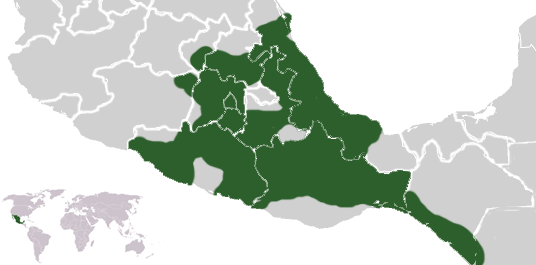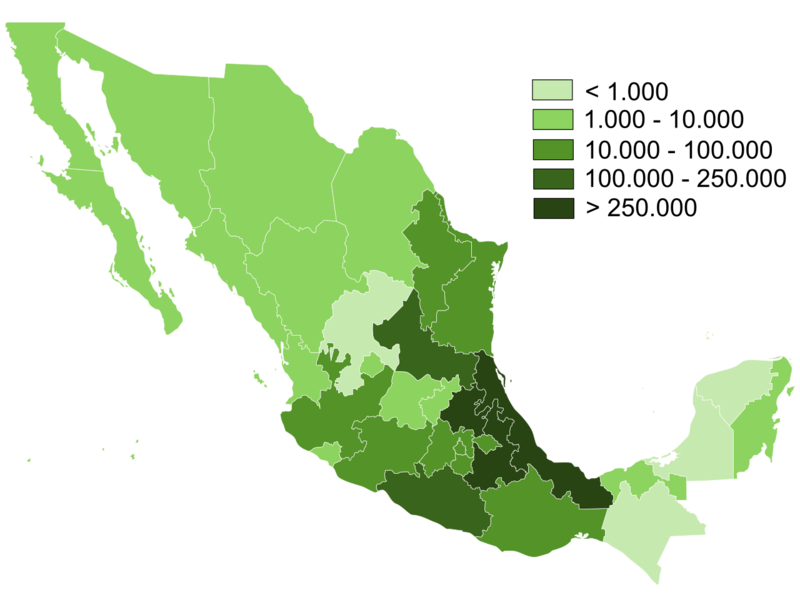gangleri2001
Garbage day!!!
Hi fans of the aztec civilization!
This is our corner. Here, spirituallity and aggressiveness will rule. This thread is created to talk about everything on our favourite civ (the real one) and learn lots of things about this amazing civ. Long live Moctezuma II! Long live the Triple Alliance!

Our wise and beloved leader, Moctezuma II (or Montezuma)

Our great empire in its maximum extent.
So let's begin! Since I'm translator, I'd like to teach everyone here the aztec language, that's to say, the nahuatl language. And here you got the first lesson!
Nahuatl for (civilized) dummies - Lesson 1: Alphabet and pronunciation
The current status of Nahuatl
First, we will take an overview on the current status of the nahuatl language. Nahuatl is spoken by ca. 1,5 million people in Mexico. Here we got a map of the distribuition of its speakers:

Fortunately, though its few number of speakers, it's not a so-endangered-language. It's widely spoken in rural areas and the new generations learn this language as their mother language, what ensures the survival of this language for, at least, one more century.
Nevertheless, it's a extremely divided language. As I've said before, it's spoken in scattered villages, what favoured the appearence of lots of dialects. Moreover, its speling has never been unified, so we got a tremendous geographic and chronological variety for the same language.
But don't worry! Here we will learn the classic Nahuatl language, since it's considered the most unified, used and known variety of this language.
See THIS wikipedia article for further information on Nahuatl's dialects.
The Nahuatl alphabet
The spanish missionares, in order to convert the aztecs, provided this language an alphabet based (obviously) on the spanish usage of the latin alphabet. That's why you'll find everything easier if you can spanish.
Nahuatl alphabet and spelling guide for (civilized) dummies
A = a as in ran
C = k as in key before a, o and u, s as in sun before e or i (see qu)
CH = ch as in challenge
CU = qu as in queen
E = e as in bet
H = h as in hay
HU = w as in way with a previous aspiration, try to pronunce hway instead of way.
I = i as in win
L = l as in low
LL = long l as in illumination
M = m as in mother
N = n as in now
O = o as in order
P = p as in pie
QU = k as in key, only to be used before e or i
T = t as in tell
TL = This sound doesn't exist in English, when you read this, try to pronunce t and l at the same time.
TZ = ts as in cats
U = oo as in moon
Y = y as in you
X = sh as in ship
Z = s as in sun
Diphtongs
AI = ey as in eye
AU = ow as in cow
DON'T FORGET THAT CH, CU, HU, LL, TL AND TZ ARE CONSIDERED LETERS IN THE NAHUATL ALPHABET!!!
Stress
The stress in nahuatl is usually on the second syllabe from the end. When the stress is in another syllabe, it is marked with the accent (´) as in the myhtic city Aztlán.
There's only a regular case where you can find always the stress at the end of the word. That's when calling a man by name (masculine vocative). Never a woman. For example, if you say "Henry is eating potatoes", you will pronunce Hénry, with the stress on the e. But if you say "Henry, come here!", then you got to pronunce "Henrý", with the stress on the y. This rule doesn't work with women.
Long and short vowels
In classic nahuatl, there are short and long vowels. As you can see, the diference between both is the duration of the pronunciation of both (one longer and the other, obviusly, shorter). The five vowels can be long or short in nahuatl. When the vowel is long, its usaly marked with a long mark on the vowel (ā , though the usage of dieresis (ä) is also normal. Since I got a keyboard configuration that lets me put the dieresis, I will use the dieresis mark in this course instead of the long mark.
, though the usage of dieresis (ä) is also normal. Since I got a keyboard configuration that lets me put the dieresis, I will use the dieresis mark in this course instead of the long mark.
Mutations
- N before P or M tends to become M
- M before any consonant or at the end of the word tends to become N
- Y becomes X at the end of the word
- TZ and CH sometimes alternate in certain contexts
- When a prefix or suffix addition creates a reduplication of vowels, then the vowel becomes a long vowel, even when there's a reduplication of long vowels (ï + ïxpan = ïxpan)
- When the letters CU and HU are placed at the end of the syllabe, then they become UC and UH but their pronunciation remains the same.
Exercices
Try to pronunce the following words:
Aztlán
Cuachtli
Tehuatl
Mëxihcah
Cuilitl
Cihuacoatl
Ticniuh
Moteuczomah
Moteuczomáh (masculine vocative usage)
Cuahuitl
Teuctli
Cicuilli
Ahquëmman
Tötah
Totahtzin
Ciyähuilia
Answers
as-TLAN
KWACH-tli
TE-watl
më-SHIH-kah
KWI-litl
si-wa-KO-atl
TIK-niw
mo-tekw-SO-mah
mo-tekw-so-MAH (masculine vocative usage)
KWA-witl
TEKW-tli
si-KWIL-li
ah-KËM-man
TO-tah
to-TAH-tsin
si-yä-wil-I-a
Lesson 1 is over!
Next lesson of this course: The Noun
This is our corner. Here, spirituallity and aggressiveness will rule. This thread is created to talk about everything on our favourite civ (the real one) and learn lots of things about this amazing civ. Long live Moctezuma II! Long live the Triple Alliance!

Our wise and beloved leader, Moctezuma II (or Montezuma)

Our great empire in its maximum extent.
So let's begin! Since I'm translator, I'd like to teach everyone here the aztec language, that's to say, the nahuatl language. And here you got the first lesson!
Nahuatl for (civilized) dummies - Lesson 1: Alphabet and pronunciation
The current status of Nahuatl
First, we will take an overview on the current status of the nahuatl language. Nahuatl is spoken by ca. 1,5 million people in Mexico. Here we got a map of the distribuition of its speakers:

Fortunately, though its few number of speakers, it's not a so-endangered-language. It's widely spoken in rural areas and the new generations learn this language as their mother language, what ensures the survival of this language for, at least, one more century.
Nevertheless, it's a extremely divided language. As I've said before, it's spoken in scattered villages, what favoured the appearence of lots of dialects. Moreover, its speling has never been unified, so we got a tremendous geographic and chronological variety for the same language.
But don't worry! Here we will learn the classic Nahuatl language, since it's considered the most unified, used and known variety of this language.
See THIS wikipedia article for further information on Nahuatl's dialects.
The Nahuatl alphabet
The spanish missionares, in order to convert the aztecs, provided this language an alphabet based (obviously) on the spanish usage of the latin alphabet. That's why you'll find everything easier if you can spanish.
Nahuatl alphabet and spelling guide for (civilized) dummies
A = a as in ran
C = k as in key before a, o and u, s as in sun before e or i (see qu)
CH = ch as in challenge
CU = qu as in queen
E = e as in bet
H = h as in hay
HU = w as in way with a previous aspiration, try to pronunce hway instead of way.
I = i as in win
L = l as in low
LL = long l as in illumination
M = m as in mother
N = n as in now
O = o as in order
P = p as in pie
QU = k as in key, only to be used before e or i
T = t as in tell
TL = This sound doesn't exist in English, when you read this, try to pronunce t and l at the same time.
TZ = ts as in cats
U = oo as in moon
Y = y as in you
X = sh as in ship
Z = s as in sun
Diphtongs
AI = ey as in eye
AU = ow as in cow
DON'T FORGET THAT CH, CU, HU, LL, TL AND TZ ARE CONSIDERED LETERS IN THE NAHUATL ALPHABET!!!
Stress
The stress in nahuatl is usually on the second syllabe from the end. When the stress is in another syllabe, it is marked with the accent (´) as in the myhtic city Aztlán.
There's only a regular case where you can find always the stress at the end of the word. That's when calling a man by name (masculine vocative). Never a woman. For example, if you say "Henry is eating potatoes", you will pronunce Hénry, with the stress on the e. But if you say "Henry, come here!", then you got to pronunce "Henrý", with the stress on the y. This rule doesn't work with women.
Long and short vowels
In classic nahuatl, there are short and long vowels. As you can see, the diference between both is the duration of the pronunciation of both (one longer and the other, obviusly, shorter). The five vowels can be long or short in nahuatl. When the vowel is long, its usaly marked with a long mark on the vowel (ā
 , though the usage of dieresis (ä) is also normal. Since I got a keyboard configuration that lets me put the dieresis, I will use the dieresis mark in this course instead of the long mark.
, though the usage of dieresis (ä) is also normal. Since I got a keyboard configuration that lets me put the dieresis, I will use the dieresis mark in this course instead of the long mark. Mutations
- N before P or M tends to become M
- M before any consonant or at the end of the word tends to become N
- Y becomes X at the end of the word
- TZ and CH sometimes alternate in certain contexts
- When a prefix or suffix addition creates a reduplication of vowels, then the vowel becomes a long vowel, even when there's a reduplication of long vowels (ï + ïxpan = ïxpan)
- When the letters CU and HU are placed at the end of the syllabe, then they become UC and UH but their pronunciation remains the same.
Exercices
Try to pronunce the following words:
Aztlán
Cuachtli
Tehuatl
Mëxihcah
Cuilitl
Cihuacoatl
Ticniuh
Moteuczomah
Moteuczomáh (masculine vocative usage)
Cuahuitl
Teuctli
Cicuilli
Ahquëmman
Tötah
Totahtzin
Ciyähuilia
Answers
as-TLAN
KWACH-tli
TE-watl
më-SHIH-kah
KWI-litl
si-wa-KO-atl
TIK-niw
mo-tekw-SO-mah
mo-tekw-so-MAH (masculine vocative usage)
KWA-witl
TEKW-tli
si-KWIL-li
ah-KËM-man
TO-tah
to-TAH-tsin
si-yä-wil-I-a
Lesson 1 is over!
Next lesson of this course: The Noun

 ), pronouncing Aztec words isn't very hard.
), pronouncing Aztec words isn't very hard.